LWS101 Assessment: Ethical Analysis of Child Consent in Healthcare
VerifiedAdded on 2023/06/08
|8
|1969
|460
Case Study
AI Summary
This case study delves into the ethical complexities surrounding a scenario where a child, Andre, presents with concerning symptoms, and a conflict arises between the nurse, Komiko, and the caregiver, Boris, regarding further medical testing. The analysis identifies ethical violations by both the caregiver, who appears to be neglecting and potentially abusing Andre, and the nurse, who compromises her professional responsibilities by deferring to the caregiver's wishes against medical recommendations. The solution proposes immediate actions, including prioritizing Andre's well-being through recommended tests and comprehensive treatment based on the principle of beneficence, reporting the caregiver to relevant child protection authorities, and reorienting the nurse on the ICN code of conduct to ensure future adherence to ethical and professional standards. The expected outcomes include Andre's recovery, improved well-being through intervention with child protective services, and the nurse's enhanced ethical awareness and professional accountability. The analysis underscores the importance of prioritizing the child's best interests and upholding ethical principles in healthcare settings.
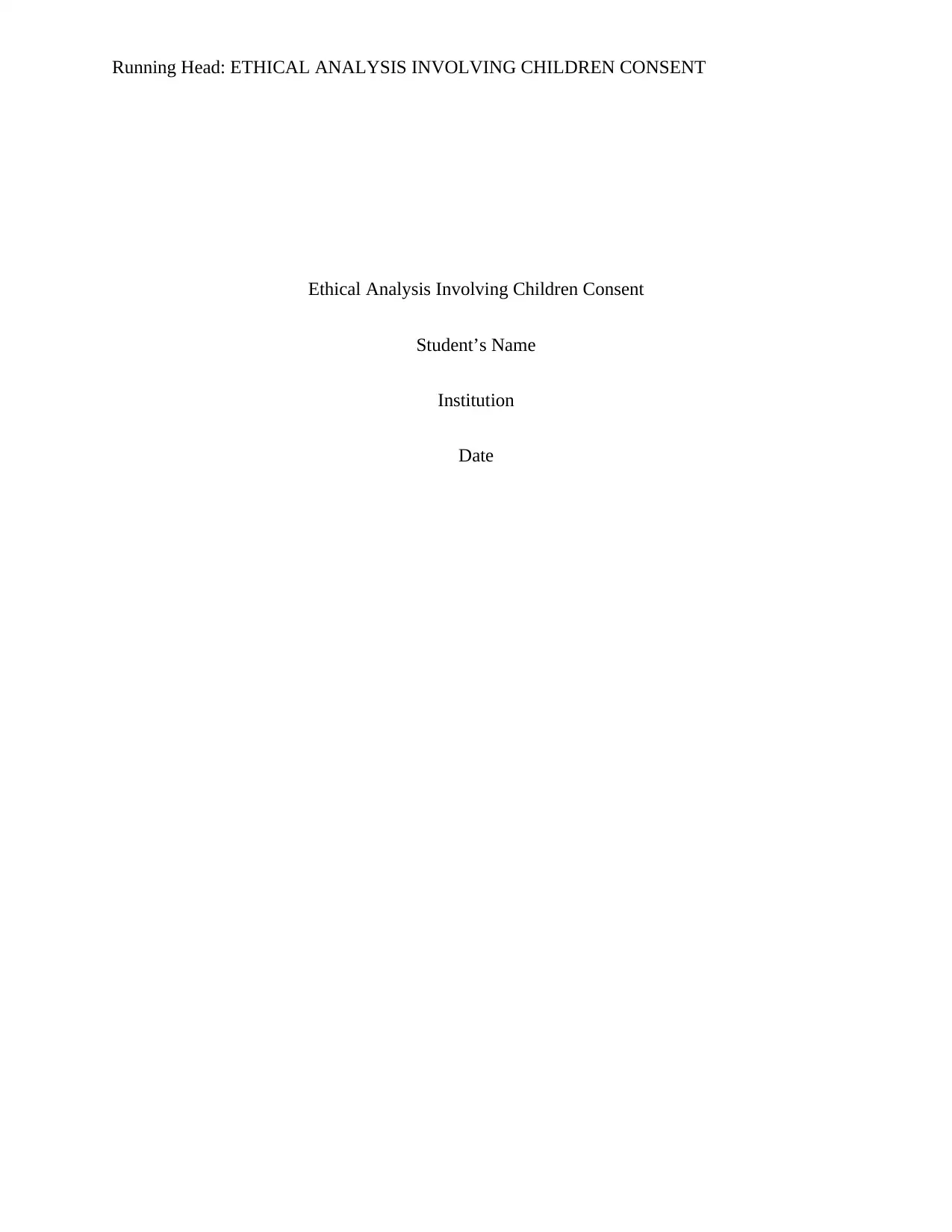
Running Head: ETHICAL ANALYSIS INVOLVING CHILDREN CONSENT
Ethical Analysis Involving Children Consent
Student’s Name
Institution
Date
Ethical Analysis Involving Children Consent
Student’s Name
Institution
Date
Paraphrase This Document
Need a fresh take? Get an instant paraphrase of this document with our AI Paraphraser
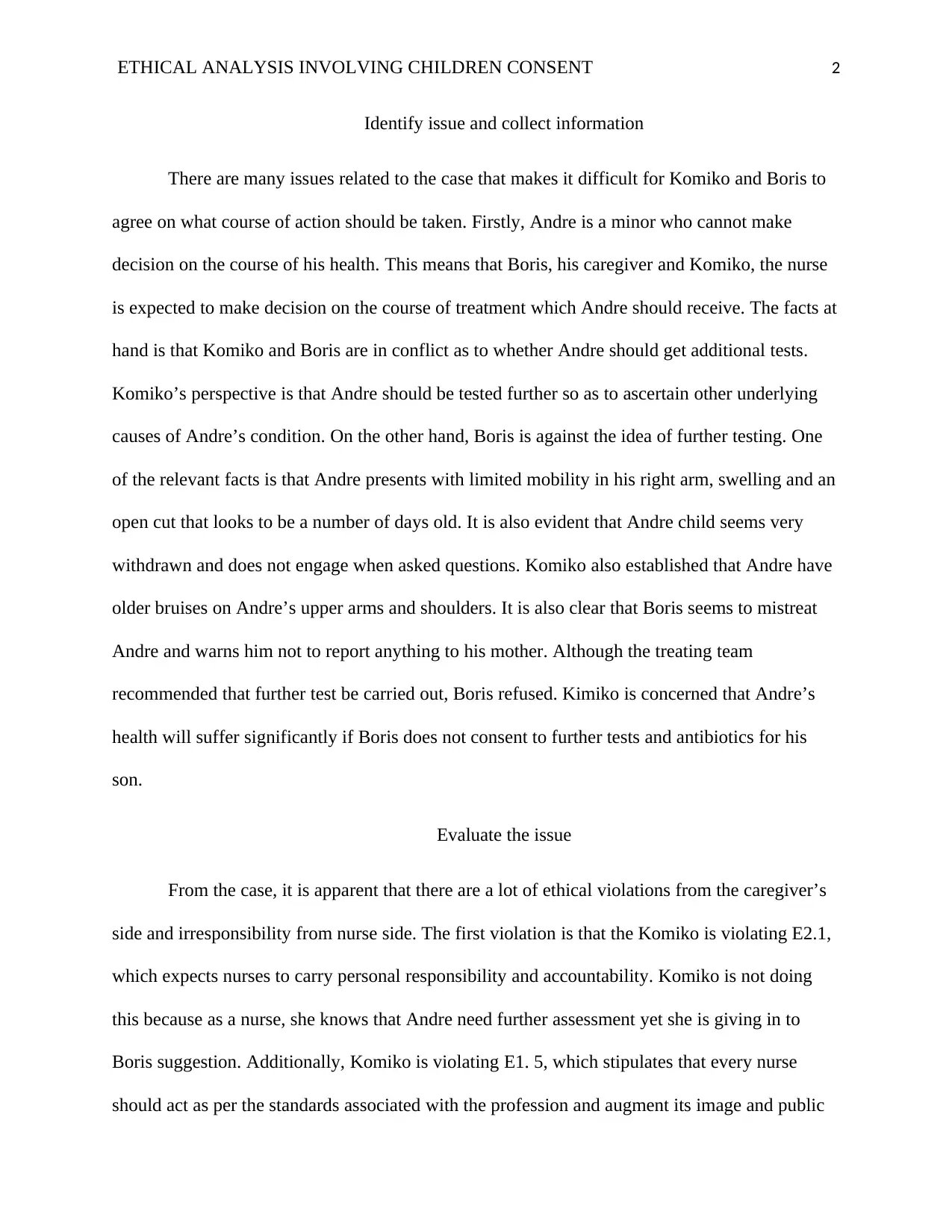
ETHICAL ANALYSIS INVOLVING CHILDREN CONSENT 2
Identify issue and collect information
There are many issues related to the case that makes it difficult for Komiko and Boris to
agree on what course of action should be taken. Firstly, Andre is a minor who cannot make
decision on the course of his health. This means that Boris, his caregiver and Komiko, the nurse
is expected to make decision on the course of treatment which Andre should receive. The facts at
hand is that Komiko and Boris are in conflict as to whether Andre should get additional tests.
Komiko’s perspective is that Andre should be tested further so as to ascertain other underlying
causes of Andre’s condition. On the other hand, Boris is against the idea of further testing. One
of the relevant facts is that Andre presents with limited mobility in his right arm, swelling and an
open cut that looks to be a number of days old. It is also evident that Andre child seems very
withdrawn and does not engage when asked questions. Komiko also established that Andre have
older bruises on Andre’s upper arms and shoulders. It is also clear that Boris seems to mistreat
Andre and warns him not to report anything to his mother. Although the treating team
recommended that further test be carried out, Boris refused. Kimiko is concerned that Andre’s
health will suffer significantly if Boris does not consent to further tests and antibiotics for his
son.
Evaluate the issue
From the case, it is apparent that there are a lot of ethical violations from the caregiver’s
side and irresponsibility from nurse side. The first violation is that the Komiko is violating E2.1,
which expects nurses to carry personal responsibility and accountability. Komiko is not doing
this because as a nurse, she knows that Andre need further assessment yet she is giving in to
Boris suggestion. Additionally, Komiko is violating E1. 5, which stipulates that every nurse
should act as per the standards associated with the profession and augment its image and public
Identify issue and collect information
There are many issues related to the case that makes it difficult for Komiko and Boris to
agree on what course of action should be taken. Firstly, Andre is a minor who cannot make
decision on the course of his health. This means that Boris, his caregiver and Komiko, the nurse
is expected to make decision on the course of treatment which Andre should receive. The facts at
hand is that Komiko and Boris are in conflict as to whether Andre should get additional tests.
Komiko’s perspective is that Andre should be tested further so as to ascertain other underlying
causes of Andre’s condition. On the other hand, Boris is against the idea of further testing. One
of the relevant facts is that Andre presents with limited mobility in his right arm, swelling and an
open cut that looks to be a number of days old. It is also evident that Andre child seems very
withdrawn and does not engage when asked questions. Komiko also established that Andre have
older bruises on Andre’s upper arms and shoulders. It is also clear that Boris seems to mistreat
Andre and warns him not to report anything to his mother. Although the treating team
recommended that further test be carried out, Boris refused. Kimiko is concerned that Andre’s
health will suffer significantly if Boris does not consent to further tests and antibiotics for his
son.
Evaluate the issue
From the case, it is apparent that there are a lot of ethical violations from the caregiver’s
side and irresponsibility from nurse side. The first violation is that the Komiko is violating E2.1,
which expects nurses to carry personal responsibility and accountability. Komiko is not doing
this because as a nurse, she knows that Andre need further assessment yet she is giving in to
Boris suggestion. Additionally, Komiko is violating E1. 5, which stipulates that every nurse
should act as per the standards associated with the profession and augment its image and public
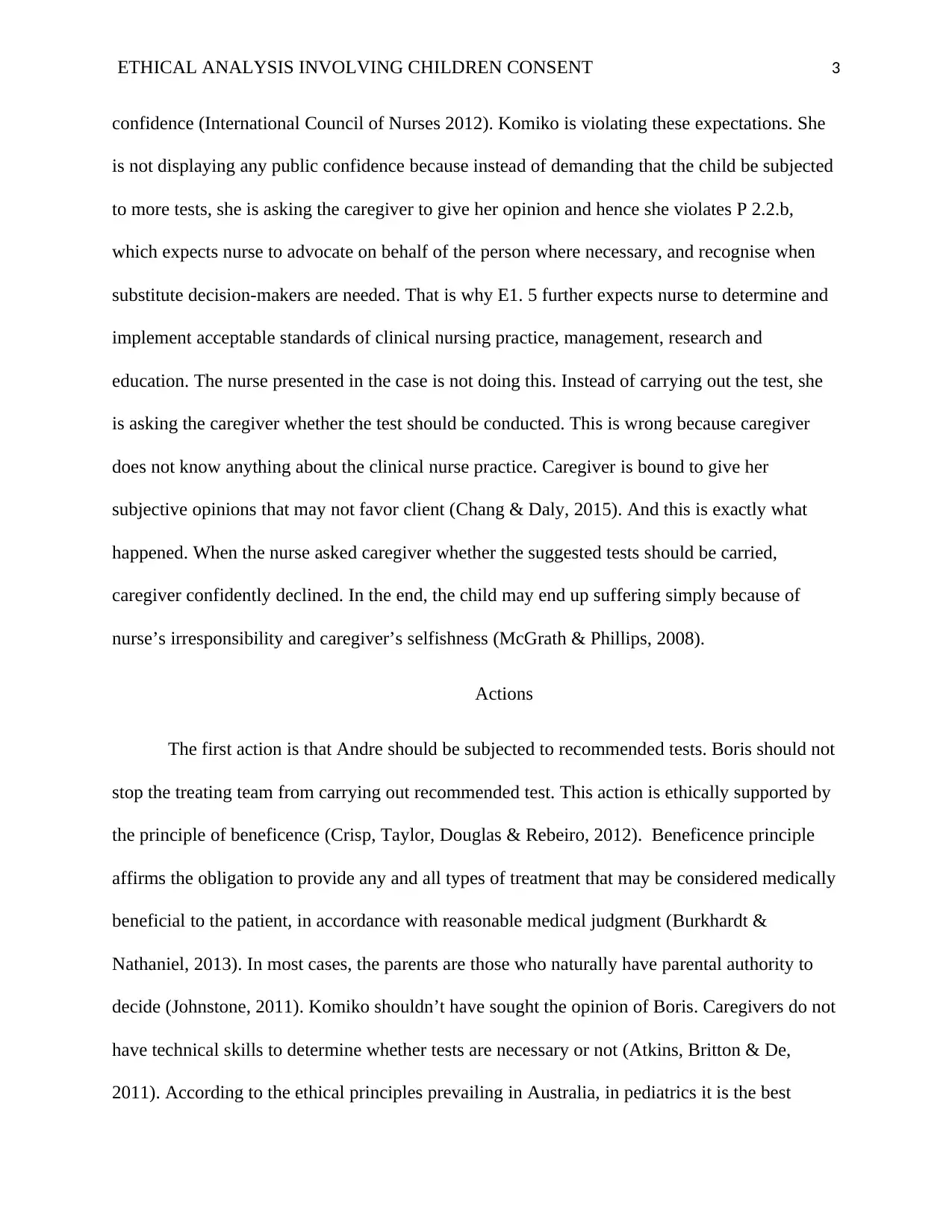
ETHICAL ANALYSIS INVOLVING CHILDREN CONSENT 3
confidence (International Council of Nurses 2012). Komiko is violating these expectations. She
is not displaying any public confidence because instead of demanding that the child be subjected
to more tests, she is asking the caregiver to give her opinion and hence she violates P 2.2.b,
which expects nurse to advocate on behalf of the person where necessary, and recognise when
substitute decision-makers are needed. That is why E1. 5 further expects nurse to determine and
implement acceptable standards of clinical nursing practice, management, research and
education. The nurse presented in the case is not doing this. Instead of carrying out the test, she
is asking the caregiver whether the test should be conducted. This is wrong because caregiver
does not know anything about the clinical nurse practice. Caregiver is bound to give her
subjective opinions that may not favor client (Chang & Daly, 2015). And this is exactly what
happened. When the nurse asked caregiver whether the suggested tests should be carried,
caregiver confidently declined. In the end, the child may end up suffering simply because of
nurse’s irresponsibility and caregiver’s selfishness (McGrath & Phillips, 2008).
Actions
The first action is that Andre should be subjected to recommended tests. Boris should not
stop the treating team from carrying out recommended test. This action is ethically supported by
the principle of beneficence (Crisp, Taylor, Douglas & Rebeiro, 2012). Beneficence principle
affirms the obligation to provide any and all types of treatment that may be considered medically
beneficial to the patient, in accordance with reasonable medical judgment (Burkhardt &
Nathaniel, 2013). In most cases, the parents are those who naturally have parental authority to
decide (Johnstone, 2011). Komiko shouldn’t have sought the opinion of Boris. Caregivers do not
have technical skills to determine whether tests are necessary or not (Atkins, Britton & De,
2011). According to the ethical principles prevailing in Australia, in pediatrics it is the best
confidence (International Council of Nurses 2012). Komiko is violating these expectations. She
is not displaying any public confidence because instead of demanding that the child be subjected
to more tests, she is asking the caregiver to give her opinion and hence she violates P 2.2.b,
which expects nurse to advocate on behalf of the person where necessary, and recognise when
substitute decision-makers are needed. That is why E1. 5 further expects nurse to determine and
implement acceptable standards of clinical nursing practice, management, research and
education. The nurse presented in the case is not doing this. Instead of carrying out the test, she
is asking the caregiver whether the test should be conducted. This is wrong because caregiver
does not know anything about the clinical nurse practice. Caregiver is bound to give her
subjective opinions that may not favor client (Chang & Daly, 2015). And this is exactly what
happened. When the nurse asked caregiver whether the suggested tests should be carried,
caregiver confidently declined. In the end, the child may end up suffering simply because of
nurse’s irresponsibility and caregiver’s selfishness (McGrath & Phillips, 2008).
Actions
The first action is that Andre should be subjected to recommended tests. Boris should not
stop the treating team from carrying out recommended test. This action is ethically supported by
the principle of beneficence (Crisp, Taylor, Douglas & Rebeiro, 2012). Beneficence principle
affirms the obligation to provide any and all types of treatment that may be considered medically
beneficial to the patient, in accordance with reasonable medical judgment (Burkhardt &
Nathaniel, 2013). In most cases, the parents are those who naturally have parental authority to
decide (Johnstone, 2011). Komiko shouldn’t have sought the opinion of Boris. Caregivers do not
have technical skills to determine whether tests are necessary or not (Atkins, Britton & De,
2011). According to the ethical principles prevailing in Australia, in pediatrics it is the best
⊘ This is a preview!⊘
Do you want full access?
Subscribe today to unlock all pages.

Trusted by 1+ million students worldwide
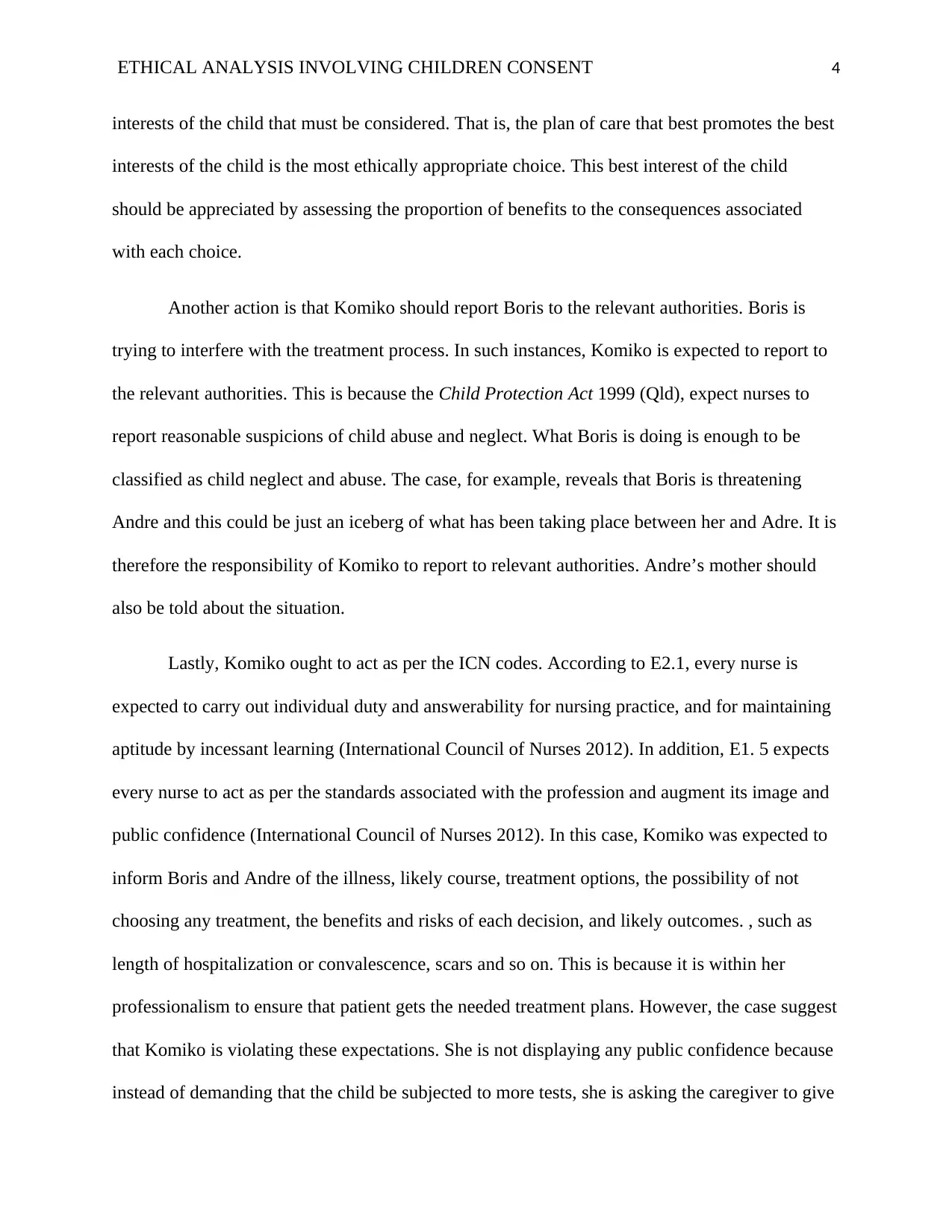
ETHICAL ANALYSIS INVOLVING CHILDREN CONSENT 4
interests of the child that must be considered. That is, the plan of care that best promotes the best
interests of the child is the most ethically appropriate choice. This best interest of the child
should be appreciated by assessing the proportion of benefits to the consequences associated
with each choice.
Another action is that Komiko should report Boris to the relevant authorities. Boris is
trying to interfere with the treatment process. In such instances, Komiko is expected to report to
the relevant authorities. This is because the Child Protection Act 1999 (Qld), expect nurses to
report reasonable suspicions of child abuse and neglect. What Boris is doing is enough to be
classified as child neglect and abuse. The case, for example, reveals that Boris is threatening
Andre and this could be just an iceberg of what has been taking place between her and Adre. It is
therefore the responsibility of Komiko to report to relevant authorities. Andre’s mother should
also be told about the situation.
Lastly, Komiko ought to act as per the ICN codes. According to E2.1, every nurse is
expected to carry out individual duty and answerability for nursing practice, and for maintaining
aptitude by incessant learning (International Council of Nurses 2012). In addition, E1. 5 expects
every nurse to act as per the standards associated with the profession and augment its image and
public confidence (International Council of Nurses 2012). In this case, Komiko was expected to
inform Boris and Andre of the illness, likely course, treatment options, the possibility of not
choosing any treatment, the benefits and risks of each decision, and likely outcomes. , such as
length of hospitalization or convalescence, scars and so on. This is because it is within her
professionalism to ensure that patient gets the needed treatment plans. However, the case suggest
that Komiko is violating these expectations. She is not displaying any public confidence because
instead of demanding that the child be subjected to more tests, she is asking the caregiver to give
interests of the child that must be considered. That is, the plan of care that best promotes the best
interests of the child is the most ethically appropriate choice. This best interest of the child
should be appreciated by assessing the proportion of benefits to the consequences associated
with each choice.
Another action is that Komiko should report Boris to the relevant authorities. Boris is
trying to interfere with the treatment process. In such instances, Komiko is expected to report to
the relevant authorities. This is because the Child Protection Act 1999 (Qld), expect nurses to
report reasonable suspicions of child abuse and neglect. What Boris is doing is enough to be
classified as child neglect and abuse. The case, for example, reveals that Boris is threatening
Andre and this could be just an iceberg of what has been taking place between her and Adre. It is
therefore the responsibility of Komiko to report to relevant authorities. Andre’s mother should
also be told about the situation.
Lastly, Komiko ought to act as per the ICN codes. According to E2.1, every nurse is
expected to carry out individual duty and answerability for nursing practice, and for maintaining
aptitude by incessant learning (International Council of Nurses 2012). In addition, E1. 5 expects
every nurse to act as per the standards associated with the profession and augment its image and
public confidence (International Council of Nurses 2012). In this case, Komiko was expected to
inform Boris and Andre of the illness, likely course, treatment options, the possibility of not
choosing any treatment, the benefits and risks of each decision, and likely outcomes. , such as
length of hospitalization or convalescence, scars and so on. This is because it is within her
professionalism to ensure that patient gets the needed treatment plans. However, the case suggest
that Komiko is violating these expectations. She is not displaying any public confidence because
instead of demanding that the child be subjected to more tests, she is asking the caregiver to give
Paraphrase This Document
Need a fresh take? Get an instant paraphrase of this document with our AI Paraphraser
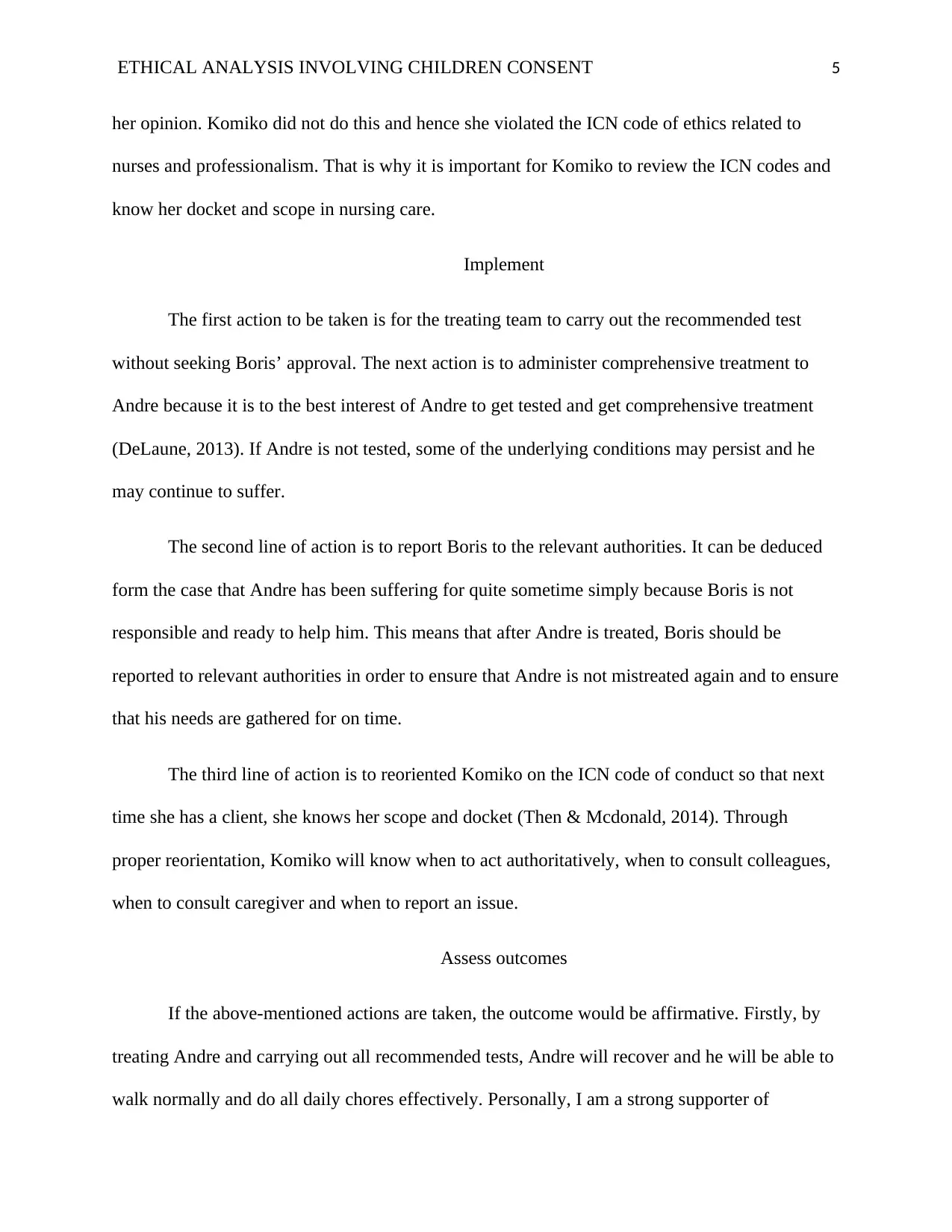
ETHICAL ANALYSIS INVOLVING CHILDREN CONSENT 5
her opinion. Komiko did not do this and hence she violated the ICN code of ethics related to
nurses and professionalism. That is why it is important for Komiko to review the ICN codes and
know her docket and scope in nursing care.
Implement
The first action to be taken is for the treating team to carry out the recommended test
without seeking Boris’ approval. The next action is to administer comprehensive treatment to
Andre because it is to the best interest of Andre to get tested and get comprehensive treatment
(DeLaune, 2013). If Andre is not tested, some of the underlying conditions may persist and he
may continue to suffer.
The second line of action is to report Boris to the relevant authorities. It can be deduced
form the case that Andre has been suffering for quite sometime simply because Boris is not
responsible and ready to help him. This means that after Andre is treated, Boris should be
reported to relevant authorities in order to ensure that Andre is not mistreated again and to ensure
that his needs are gathered for on time.
The third line of action is to reoriented Komiko on the ICN code of conduct so that next
time she has a client, she knows her scope and docket (Then & Mcdonald, 2014). Through
proper reorientation, Komiko will know when to act authoritatively, when to consult colleagues,
when to consult caregiver and when to report an issue.
Assess outcomes
If the above-mentioned actions are taken, the outcome would be affirmative. Firstly, by
treating Andre and carrying out all recommended tests, Andre will recover and he will be able to
walk normally and do all daily chores effectively. Personally, I am a strong supporter of
her opinion. Komiko did not do this and hence she violated the ICN code of ethics related to
nurses and professionalism. That is why it is important for Komiko to review the ICN codes and
know her docket and scope in nursing care.
Implement
The first action to be taken is for the treating team to carry out the recommended test
without seeking Boris’ approval. The next action is to administer comprehensive treatment to
Andre because it is to the best interest of Andre to get tested and get comprehensive treatment
(DeLaune, 2013). If Andre is not tested, some of the underlying conditions may persist and he
may continue to suffer.
The second line of action is to report Boris to the relevant authorities. It can be deduced
form the case that Andre has been suffering for quite sometime simply because Boris is not
responsible and ready to help him. This means that after Andre is treated, Boris should be
reported to relevant authorities in order to ensure that Andre is not mistreated again and to ensure
that his needs are gathered for on time.
The third line of action is to reoriented Komiko on the ICN code of conduct so that next
time she has a client, she knows her scope and docket (Then & Mcdonald, 2014). Through
proper reorientation, Komiko will know when to act authoritatively, when to consult colleagues,
when to consult caregiver and when to report an issue.
Assess outcomes
If the above-mentioned actions are taken, the outcome would be affirmative. Firstly, by
treating Andre and carrying out all recommended tests, Andre will recover and he will be able to
walk normally and do all daily chores effectively. Personally, I am a strong supporter of
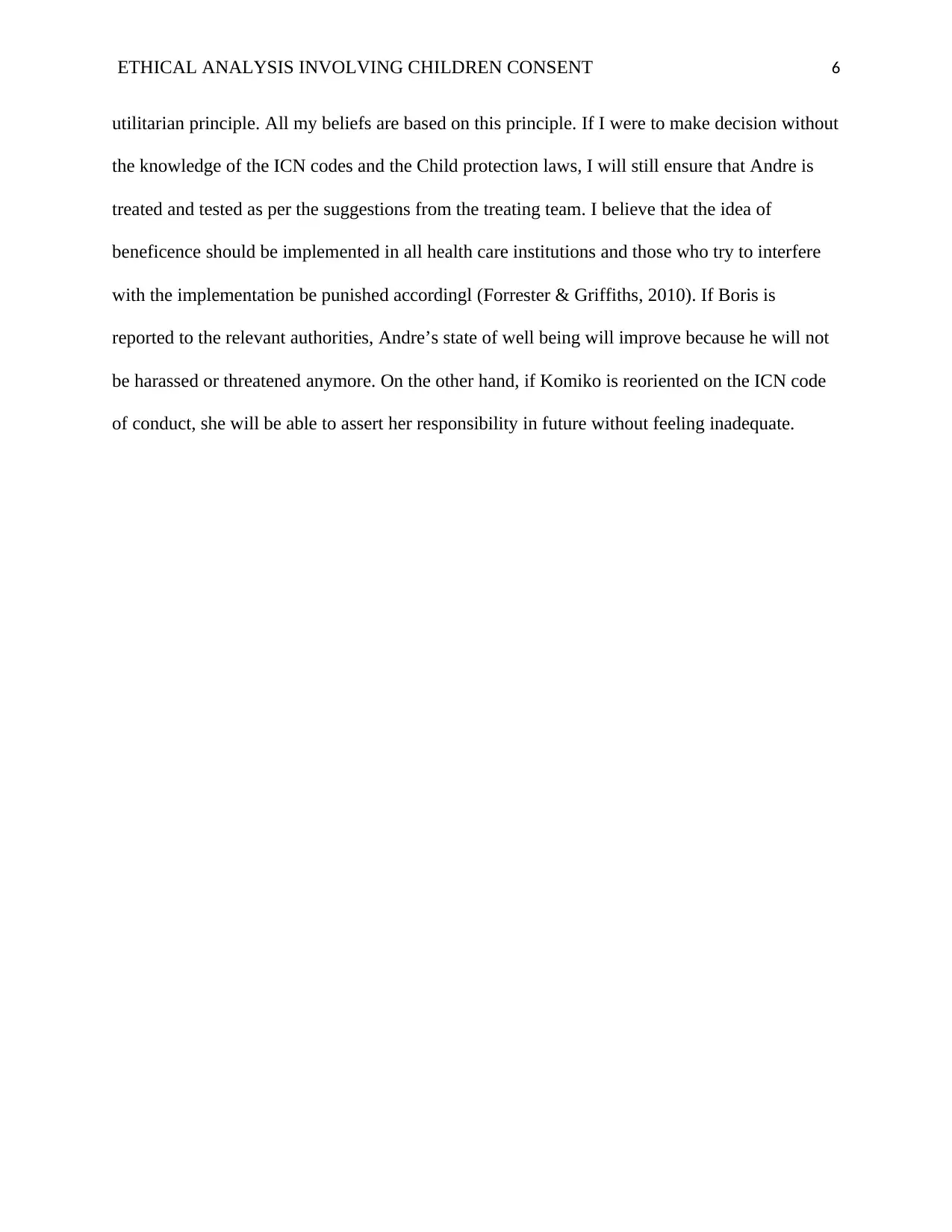
ETHICAL ANALYSIS INVOLVING CHILDREN CONSENT 6
utilitarian principle. All my beliefs are based on this principle. If I were to make decision without
the knowledge of the ICN codes and the Child protection laws, I will still ensure that Andre is
treated and tested as per the suggestions from the treating team. I believe that the idea of
beneficence should be implemented in all health care institutions and those who try to interfere
with the implementation be punished accordingl (Forrester & Griffiths, 2010). If Boris is
reported to the relevant authorities, Andre’s state of well being will improve because he will not
be harassed or threatened anymore. On the other hand, if Komiko is reoriented on the ICN code
of conduct, she will be able to assert her responsibility in future without feeling inadequate.
utilitarian principle. All my beliefs are based on this principle. If I were to make decision without
the knowledge of the ICN codes and the Child protection laws, I will still ensure that Andre is
treated and tested as per the suggestions from the treating team. I believe that the idea of
beneficence should be implemented in all health care institutions and those who try to interfere
with the implementation be punished accordingl (Forrester & Griffiths, 2010). If Boris is
reported to the relevant authorities, Andre’s state of well being will improve because he will not
be harassed or threatened anymore. On the other hand, if Komiko is reoriented on the ICN code
of conduct, she will be able to assert her responsibility in future without feeling inadequate.
⊘ This is a preview!⊘
Do you want full access?
Subscribe today to unlock all pages.

Trusted by 1+ million students worldwide
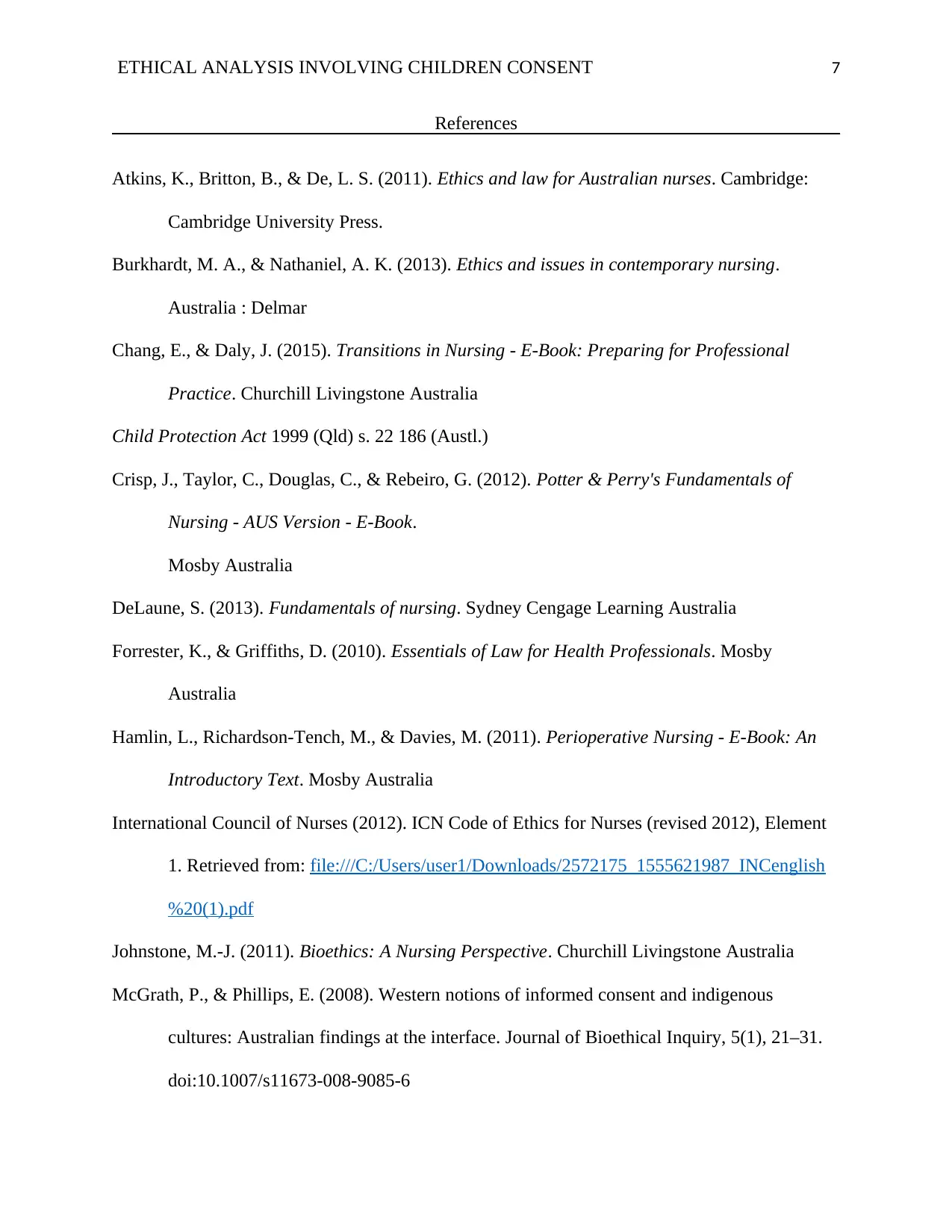
ETHICAL ANALYSIS INVOLVING CHILDREN CONSENT 7
References
Atkins, K., Britton, B., & De, L. S. (2011). Ethics and law for Australian nurses. Cambridge:
Cambridge University Press.
Burkhardt, M. A., & Nathaniel, A. K. (2013). Ethics and issues in contemporary nursing.
Australia : Delmar
Chang, E., & Daly, J. (2015). Transitions in Nursing - E-Book: Preparing for Professional
Practice. Churchill Livingstone Australia
Child Protection Act 1999 (Qld) s. 22 186 (Austl.)
Crisp, J., Taylor, C., Douglas, C., & Rebeiro, G. (2012). Potter & Perry's Fundamentals of
Nursing - AUS Version - E-Book.
Mosby Australia
DeLaune, S. (2013). Fundamentals of nursing. Sydney Cengage Learning Australia
Forrester, K., & Griffiths, D. (2010). Essentials of Law for Health Professionals. Mosby
Australia
Hamlin, L., Richardson-Tench, M., & Davies, M. (2011). Perioperative Nursing - E-Book: An
Introductory Text. Mosby Australia
International Council of Nurses (2012). ICN Code of Ethics for Nurses (revised 2012), Element
1. Retrieved from: file:///C:/Users/user1/Downloads/2572175_1555621987_INCenglish
%20(1).pdf
Johnstone, M.-J. (2011). Bioethics: A Nursing Perspective. Churchill Livingstone Australia
McGrath, P., & Phillips, E. (2008). Western notions of informed consent and indigenous
cultures: Australian findings at the interface. Journal of Bioethical Inquiry, 5(1), 21–31.
doi:10.1007/s11673-008-9085-6
References
Atkins, K., Britton, B., & De, L. S. (2011). Ethics and law for Australian nurses. Cambridge:
Cambridge University Press.
Burkhardt, M. A., & Nathaniel, A. K. (2013). Ethics and issues in contemporary nursing.
Australia : Delmar
Chang, E., & Daly, J. (2015). Transitions in Nursing - E-Book: Preparing for Professional
Practice. Churchill Livingstone Australia
Child Protection Act 1999 (Qld) s. 22 186 (Austl.)
Crisp, J., Taylor, C., Douglas, C., & Rebeiro, G. (2012). Potter & Perry's Fundamentals of
Nursing - AUS Version - E-Book.
Mosby Australia
DeLaune, S. (2013). Fundamentals of nursing. Sydney Cengage Learning Australia
Forrester, K., & Griffiths, D. (2010). Essentials of Law for Health Professionals. Mosby
Australia
Hamlin, L., Richardson-Tench, M., & Davies, M. (2011). Perioperative Nursing - E-Book: An
Introductory Text. Mosby Australia
International Council of Nurses (2012). ICN Code of Ethics for Nurses (revised 2012), Element
1. Retrieved from: file:///C:/Users/user1/Downloads/2572175_1555621987_INCenglish
%20(1).pdf
Johnstone, M.-J. (2011). Bioethics: A Nursing Perspective. Churchill Livingstone Australia
McGrath, P., & Phillips, E. (2008). Western notions of informed consent and indigenous
cultures: Australian findings at the interface. Journal of Bioethical Inquiry, 5(1), 21–31.
doi:10.1007/s11673-008-9085-6
Paraphrase This Document
Need a fresh take? Get an instant paraphrase of this document with our AI Paraphraser
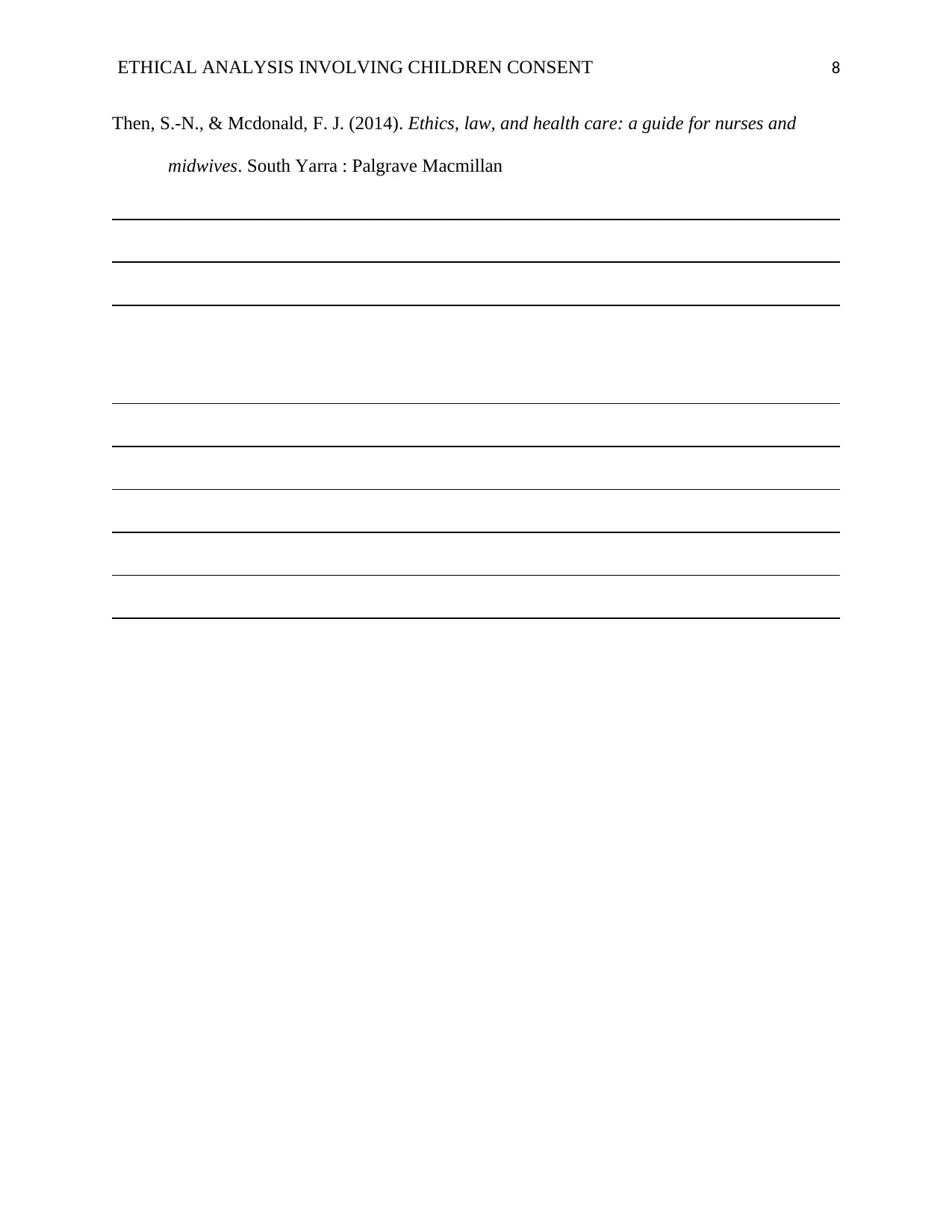
ETHICAL ANALYSIS INVOLVING CHILDREN CONSENT 8
Then, S.-N., & Mcdonald, F. J. (2014). Ethics, law, and health care: a guide for nurses and
midwives. South Yarra : Palgrave Macmillan
Then, S.-N., & Mcdonald, F. J. (2014). Ethics, law, and health care: a guide for nurses and
midwives. South Yarra : Palgrave Macmillan
1 out of 8
Related Documents
Your All-in-One AI-Powered Toolkit for Academic Success.
+13062052269
info@desklib.com
Available 24*7 on WhatsApp / Email
![[object Object]](/_next/static/media/star-bottom.7253800d.svg)
Unlock your academic potential
Copyright © 2020–2026 A2Z Services. All Rights Reserved. Developed and managed by ZUCOL.




